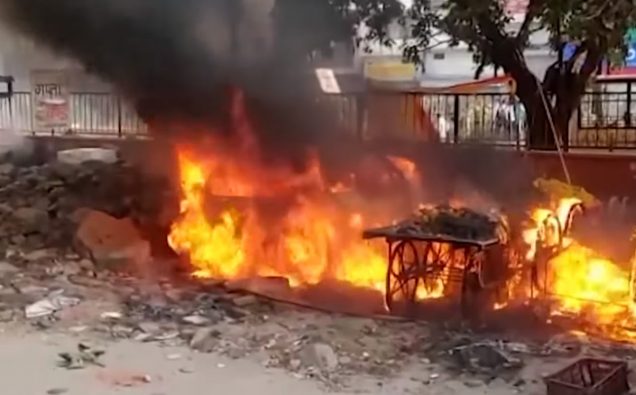
As images of gruesome violence in capital New Delhi – mostly targeting Muslims -tarnish India’s international standing, former prime Minister Manmohan Singh has warned that social tensions would “char soul” of the country, once held up as a diverse democratic model.
Writing with an op-ed piece in The Hindu with a “heavy heart” Singh sees India dipping into deep troubles from a raft of challenges including self-inflicted social unrest, economic downturn and contagion of COVID-19 coronavirus outbreak.
“I deeply worry that this potent combination of risks may not only rupture the soul of India but also diminish our global standing as an economic and democratic power in the world.”
Specifically writing about weeks of bloodshed that set Delhi’s Muslim neighborhood ablaze in red flames, Singh, who served as leader of Congress-led governments from 2004 to 2014, faults politicians, law enforcement, judiciary and media for failing the country.
“Delhi has been subjected to extreme violence over the past few weeks. We have lost nearly 50 of our fellow Indians for no reason. Several hundred people have suffered injuries.
“Communal tensions have been stoked and flames of religious intolerance fanned by unruly sections of our society, including the political class. University campuses, public places and private homes are bearing the brunt of communal outbursts of violence, reminiscent of the dark periods in India’s history. Institutions of law and order have abandoned their dharma to protect citizens. Institutions of justice and the fourth pillar of democracy, the media, have also failed us.
“With no checks, the fire of social tensions is rapidly spreading across the nation and threatens to char the soul of our nation. It can only be extinguished by the same people that lit it.”
Singh writes that every act of sectarian violence is a blemish on a democratic India as envisaged by its founder Mahatma Gandhi – who was also murdered by a follower of RSS – the militant organization that has explicitly advanced Hindutva ideology of the majority Hindu population over minority communities, and influenced political thinking of several members of Prime Minister Narendra Modi‘s BJP political party.
“Just in a matter of few years, India has slid rapidly from being a global showcase of a model of economic development through liberal democratic methods to a strife ridden majoritarian state in economic despair,” writes the former leader, who is credited with setting the momentum for India’s rapid economic rise in the last decade.
Modi, the ultra-nationalist prime minister, also had his appeal rooted partly in economic advancement of Gujarat, when he was chief minister of the state in the early years of the century. But since his reelection for the second term last year, Modi has implemented a range of policies – reversal of Muslim-majority Kashmir region’s autonomy and citizenship amendment act that bars Muslims from seeking Indian citizenship – that please his right-wing base but have led to widespread opposition and protests.
“At a time when our economy is floundering, the impact of such social unrest will only exacerbate the economic slowdown. It is now well accepted that the scourge of India’s economy currently is the lack of new investment by the private sector. Investors, industrialists and entrepreneurs are unwilling to undertake new projects and have lost their risk appetite,” Singh notes.
“Social disruptions and communal tensions only compound their fears and risk aversion. Social harmony, the bedrock of economic development, is now under peril. No amount of tweaking of tax rates, showering of corporate incentives or goading will propel Indian or foreign businesses to invest, when the risk of eruption of sudden violence in one’s neighborhood looms large. Lack of investment means lack of jobs and incomes, which, in turn, means lack of consumption and demand in the economy. A lack of demand will only further suppress private investments. This is the vicious cycle that our economy is stuck in,” the elderly leader warns as challenges blunt India’s economic growth.
















